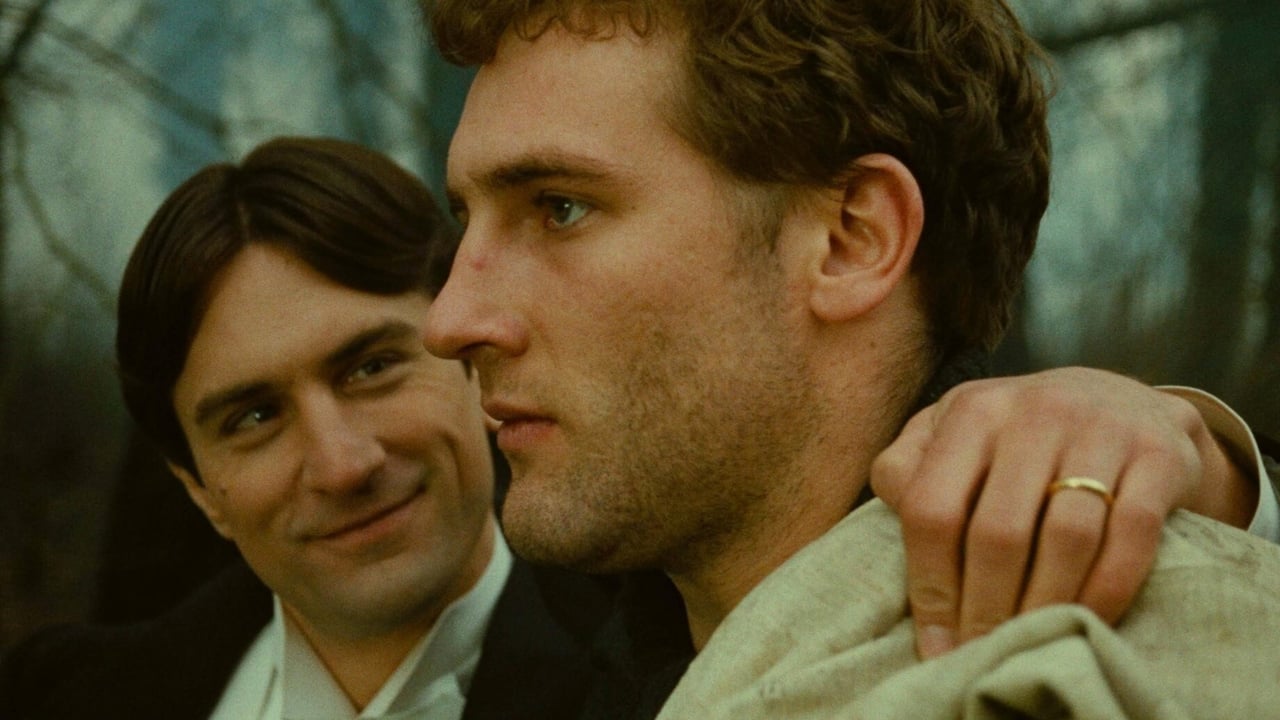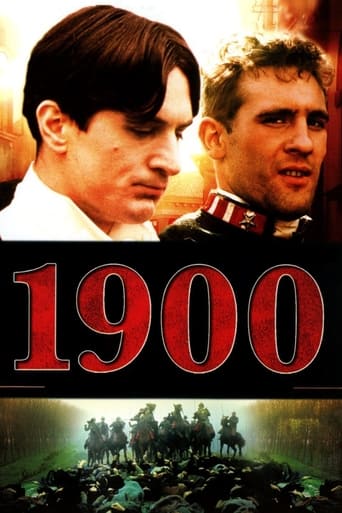Eumenides_0
Bernardo Bertolucci's Novecento has five hours and fifteen minutes and before we know it this historical epic ends and we're left craving for more. That's the ultimate grace of Bertolucci's masterpiece: one never feels the movie's length; it flows and involves us so hypnotically in its story that we lose sense of time. The story is so finely constructed, the actors so good, the cinematography so breath-taking, the music so exciting, that one curses the unavoidable moment when the credits roll down the screen.Released in 1976, Novecento is, as the title says it, a story of Italy in the 20th century, from its beginning to the year of its release. Known in the USA as 1900, I chose the Italian title because this one misleading. The action starts the year Italian composer Verdi dies, so it's actually 1901 (Bertolucci knows the Gregorian calendar unlike the majority who believe in pop culture). Two children are born, Alfredo and Olmo, the first the heir of the Berlinghieri estate and fortune, the second the bastard offspring of Alfredo's father and a peasant woman from the Dalco clan. They grow together and their lives, although going in different ways many times, continue to intertwine throughout the decades, from the aftermath of WWI to the rise of Fascism in Italy, to the liberation of Italy in 1945; they're always together until their old age.Novecento is effectively about the organisation of the labour rights movement in Italy and its clashes with Fascism. Olmo (Gérard Depardieu), returned from the WWI, sees communism as a way of uniting the peasants in the struggle for better wages and more rights and end the hunger and humiliations perpetuated by the padrones, the bosses.Parallel to the labour rights movement's organisation is the rise of fascism, embodied by Attila Mellanchini (Donald Sutherland), the Berlinghieri forearm who organizes the local Black Shirts. In the middle of this struggle is Alfredo (Robert DeNiro), a bon vivant who only seeks pleasure and finds love in Ada (Dominique Sanda), an avant-garde woman who fascinates him with her sense of modernity. Unwilling kept away from the war thanks to his father's money, Alfredo sees Olmo's return as good news until politics and his inevitable fate of becoming the new padrone get in the way, not to mention his inability to stand up to Attila.The film is shot in four sections, each one employing a different color palette, to represent each station of the year. So the first part, Olmo and Alfredo's birth and childhood, is bathed in bright summer colors; the WWI's aftermath is filmed with autumnal browns. The Fascist reign is grey and drenched in winter rains, and only Italy's liberation gives the movie its bright early colors with the coming of springtime. This is one of the greatest achievements of Vittorio Storaro, a director of cinematography who never ceases to amaze me. He's lent his talent to many good movies over his legendary career (Apocalypse Now, The Conformist, The Bird with the Crystal Plumage, Reds), but I've never loved the look of one of his movies so much except perhaps in an earlier, much neglected Bertolucci movie called The Spider's Stratagem. Each shot could be a painting.The actors are also excellent here, especially the veterans Burt Lancaster (who plays Alfredo's grandfather, also named Alfredo) and Sterling Hayden, who plays Leo, the patriarch of the Dalco family. They're in the movie for about an hour, but their performances are amazing enough to leave an impression, especially Hayden's.As much as this movie is about fascism and communism, it's also about class differences and class clashes, and this is shown in the three Berlinghieri generations. Grandfather Alfredo and Leo have a relationship based on respect and co-dependence. His son Giovanni brings technology and consequently unemployment to his lands as well as the violent Attila to keep the workers in order, and also ends many of the ancestral rights the workers had. His despotic rule marks the beginning of the peasants' consciousness that change is necessary. Giovanni's brother, Ottavio, is his opposite, preferring to travel and enjoy life, much like his nephew. Finally Alfredo simply doesn't care, pursuing self-gratification and allowing Attila to gain power and impose a reign of terror in his lands, with the help of Alfredo's cousin, Regina (Laura Betti).Donald Sutherland has always had a gift for playing villains but he set a bar too high even for himself to surpass when he played Attila, the sadistic Black Shirt who crushes kittens to make philosophical points about communism, molests children and kills helpless old people. Fans of Sutherland who wish to see him at his darkest and most intimidating mustn't miss this film.DeNiro, Sanda, Betti and Depardieu are also very good, with Depardieu outshining DeNiro only because he has a more demanding and visible role. Sanda is also good, even if her role is to be basically annoying most of the time. Betti makes a great demonic pair with Sutherland. DeNiro, today the most famous of the actors who worked in this film, delivers one of his typically good performances, but he doesn't reinvent himself like in Taxi Driver or Raging Bull. This is Depardieu's film.Also worthy of note is Ennio Morricone's score, containing many of his most uplifting compositions. Bertolucci made this film to inflame hearts and rouse consciousnesses, to make viewers leave the cinemas anxious to change society and make the world a better, fairer place, so Morricone's music works perfectly with the images. And even if Bertolucci's goal ultimately failed, the movie is so well crafted its grandiose finale should leave viewers pretty upbeat and hopeful.No review of Novecento can do the movie justice. It's a work of art, it must be watched.

